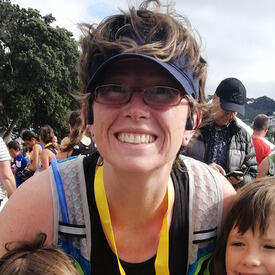Logging accuracy, consistency, and you're probably eating more than you think.
Replies
-
I don't own a food scale, and wouldn't use it if I did, I just try to take the inaccuracy into account. I set my calorie goals a bit lower and don't eat my exercise gains to try to compensate for the mistakes I'm bound to make.2
-
So what if you’re underestimating? I did. Until I learned.Emilyestelle1 wrote: »I don't own a food scale, and wouldn't use it if I did, I just try to take the inaccuracy into account. I set my calorie goals a bit lower and don't eat my exercise gains to try to compensate for the mistakes I'm bound to make.
4 -
Emilyestelle1 wrote: »I don't own a food scale, and wouldn't use it if I did, I just try to take the inaccuracy into account. I set my calorie goals a bit lower and don't eat my exercise gains to try to compensate for the mistakes I'm bound to make.
Results are what matter, the process you use to get there is irrelevant.
If this approach works for you then there's no point in adding complexity or extra steps. Getting where you need to go via the path of least resistance is the key. You only need to be as diligent and put in the minimum amount of effort as required. Anything above and beyond that is wasted.
It is good to know though that if the less stringent approach stops working there's always something more you can start doing to get the results happening again.1 -
Bumping given the current climate.
Stay safe everyone!0 -
Thanks @Avidkeo this is an important thread.0
-
still holds true0
-
Sticky?
This needs to be read by every person -- there are several daily -- who claim that they can't lose weight despite eating at some low calorie level and "measuring and weighing everything." Inaccurate logging is a much more likely cause of these problems than hormonal or other medical issues. (Not that these problems don't exist.)
Agreed. And as an aside it's another reason why you can't necessarily assume someone is eating a given number of calories just because they claim they eat a given number of calories.
So for example if someone says "I'm eating 1200 calories and I can't lose" you can't necessarily assume that they are actually eating 1200 calories.
This is usually what I come across when helping people when they say they can't lose. Either their diary is very inconsistent or they later admit that they aren't logging everything.
P.J.0 -
I don't weigh my food. If my results go stupid fast or stupid slow or stop I will reassess but as with all things, I'm not going to change something that is working/has worked. And I'm down from obese to 145/within the healthy range for my height.
Rough estimates and experimentation work for TDEE (you will never know exactly at the start), activity level (you will never have consistency), exercise burn (you won't know without experimentation and it's all averages and varies by activity). I'm cool with my food/calorie intake being treated the same way as my calories burned.
4 -
I don't think there is any issue with people who are weighing/ logging loosely, or not at all - if whatever they are doing is working - ie they are losing/ maintaining/ gaining at the rate they intend
I know there are some You must use a food scale and log to the nth degree!!!! posts - but most of us understand it is results that matter, not the process to get there.2 -
It at least helps to weigh food as a reality check from time to time so you don't get skewed ideas. I cut off what I thought was 1 oz of cheese but then it was only 1/2 oz, and what I thought was 6 oz of yogurt was actually 8.2
-
It at least helps to weigh food as a reality check from time to time so you don't get skewed ideas. I cut off what I thought was 1 oz of cheese but then it was only 1/2 oz, and what I thought was 6 oz of yogurt was actually 8.
Sure, you may be mis estimating amounts or ' getting skewed ideas' - But even that doesn't really matter if your results are not changing1 -
Yeah, this thread was written for those who don't think it's working (or have hit some kind of plateau) but yet haven't logged food and just can't figure it out, @wunderkindking
The essence of the OP, since it's been a while:<snip> Speaking from my experiences dieting, back when I was tracking intake any time I would hit a plateau the first thing I would examine would be tracking accuracy and most often this would solve the problem. I was simply eating more than I thought I was and I realize this happens and I make efforts to correct this. Now of course sometimes you also have to make adjustments to intake/activity, but over long periods of dieting it's very easy for additional inaccuracies to start popping up. Taking a nibble of this or that, not using the food scale, eyeballing certain portions, completely neglecting to log a certain item, not logging various supplements or beverages or condiments -- all of these things can stack up to a substantial difference in what is logged vs what is actually consumed.
Logging consistency is another often neglected component to this. You may be logging 1500 calories per day for 11 days followed by missing a weekend here or there, or missing entire meals on certain days, etc.
I'd like to make an important point about this that typically gets missed in the forums when this is brought up. I don't believe that logging inaccuracies are necessarily a function of honesty. They CAN be, but what I mean by this is that you are not necessarily being accused of being dishonest or lacking integrity if it is pointed out to you that you're not actually eating 900 calories and not losing weight. There are a variety of reasons that logging can be inaccurate but this happens to well intentioned and honest people. <snip>0 -
I didn’t read through the entire thread but had a good chuckle at myself after reading one of the earliest posts that frequent entries of exactly one serving is a clue they may not be weighing. Well, I am the weirdo that actually does weigh out exactly one serving most of the time. Not sure why because I do weigh out more sometimes or less sometimes to fit it in my goal or just based on what I want. I enjoy that part of the process so it is not complex or tedious to me like it is for others.5
-
@lmf1012 I think the 'one serving' is great way to start out logging. I always encourage folks to start that way. It allows a solid visual understanding of one serving, and connects that to calorie amounts. Setting noobs up for success. You've just stuck with it
 1
1 -
I definitely advocate weighing on a food scale but I have tried weighing packaged items to see if they differ from the package weight and found they are usually so close or exact that they are not worth weighing. I have tried this with many kinds of packaged items. I also don’t weigh lettuce, cucumber, or celery. I do weigh everything else though.1
-
I didn’t read through the entire thread but had a good chuckle at myself after reading one of the earliest posts that frequent entries of exactly one serving is a clue they may not be weighing. Well, I am the weirdo that actually does weigh out exactly one serving most of the time. Not sure why because I do weigh out more sometimes or less sometimes to fit it in my goal or just based on what I want. I enjoy that part of the process so it is not complex or tedious to me like it is for others.
My concern with seeing "one serving" entries in someone's diary would be that they're picking inaccurate entries, more than that they aren't weighing, TBH. There's no way to tell from the outside if the person is weighing their "one serving" AND ALSO checking what pops up in MFP against the label in their hand, especially for prepared foods. If the label matches, you're good!
And yes, obviously some foods will have a tighter or broader margin of error - do I need to know exactly how many grams each and every cabbage leaf I used to make my cabbage rolls for lunch this week weighs? No, they're like six calories apiece, who actually cares (probably someone tracking fiber, but that's not me, so I don't). Do I need to know how many grams of beef and pork and rice I used in the filling and how much filling I used in each roll, though? Yes, absolutely, that will make a difference.
The OP makes the point that inaccurate logging is not an indictment of anyone's character. If you're prone to mindless snacking, or have attention/executive function difficulties, it can be easy to eat more than you think you do. People in general are just, as a species, really bad judges of this kind of thing - that's why apps like this, and the paper food journals that came before it, exist, but even those are only as good and reliable as the person responsible for updating the information.0 -
It is a consciousness raising exercise to log accurately. How do I not be perfect with what I eat, have compassion for my flubs, and make healthy progress? That seems why I should care about this accuracy.0
-
I am back to trying for accuracy, I am struggling with the new layout.1
Categories
- All Categories
- 1.4M Health, Wellness and Goals
- 398.2K Introduce Yourself
- 44.7K Getting Started
- 261K Health and Weight Loss
- 176.4K Food and Nutrition
- 47.7K Recipes
- 233K Fitness and Exercise
- 463 Sleep, Mindfulness and Overall Wellness
- 6.5K Goal: Maintaining Weight
- 8.7K Goal: Gaining Weight and Body Building
- 153.5K Motivation and Support
- 8.4K Challenges
- 1.4K Debate Club
- 96.5K Chit-Chat
- 2.6K Fun and Games
- 4.8K MyFitnessPal Information
- 13 News and Announcements
- 21 MyFitnessPal Academy
- 1.6K Feature Suggestions and Ideas
- 3.2K MyFitnessPal Tech Support Questions













